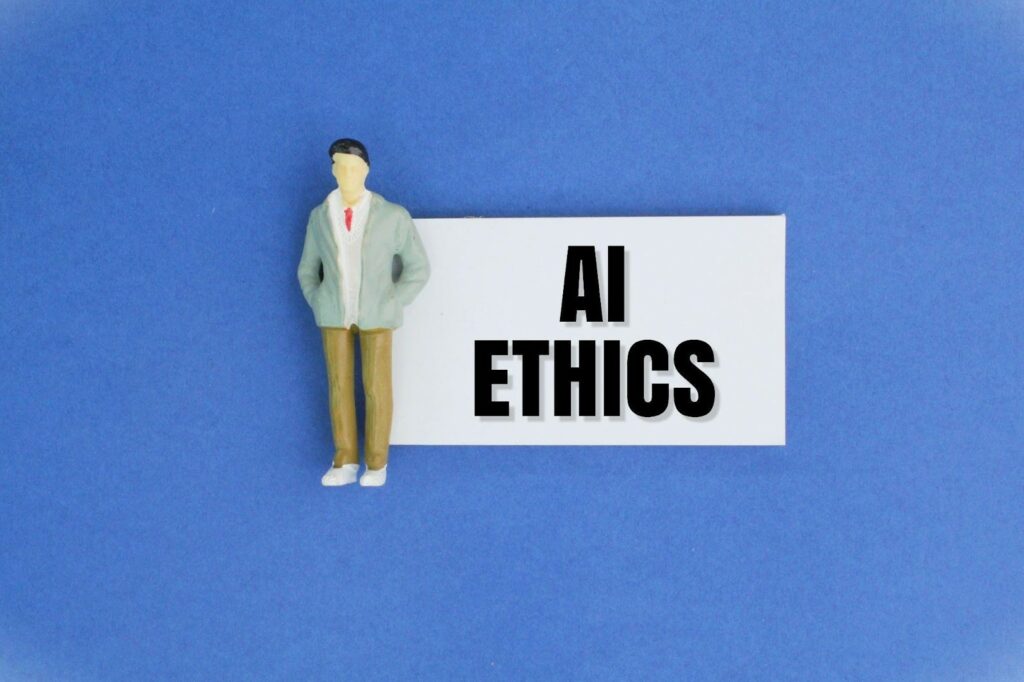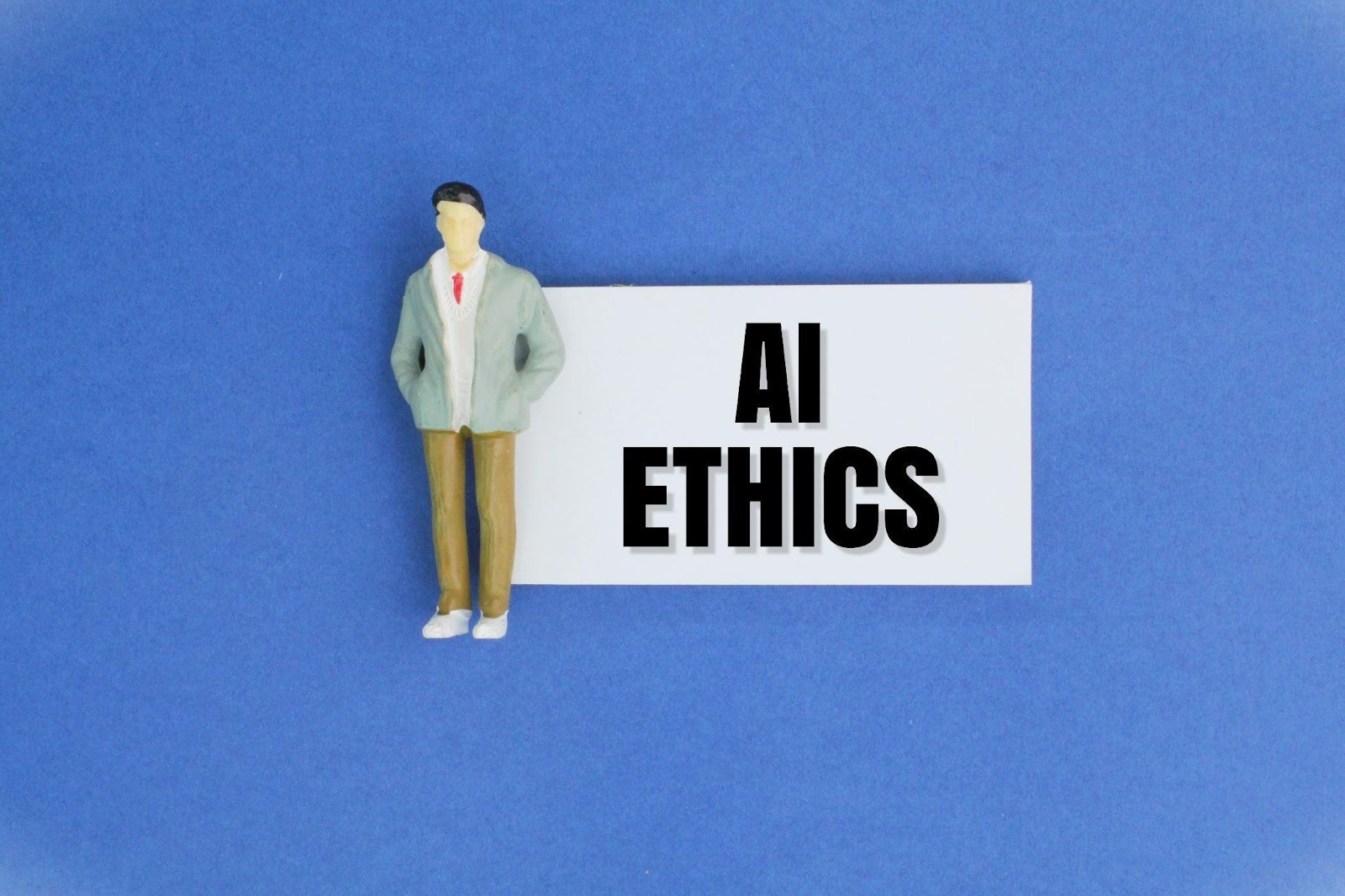AI is here and it’s here to stay. Everyone seems to have accepted this, which has sparked the conversation around ethical AI usage.
A well-defined AI code of conduct is essential. It would serve as a guiding light, helping everyone harness the power of AI while adhering to ethical principles.
In this blog post, we will uncover the significance of including ethics in AI and how that can serve as a cornerstone for fostering trust, innovation and ethical integrity within the organization.
What is Ethical AI?

At its core, Ethical AI signifies the integration of artificial intelligence solutions that operate within predefined ethical parameters. Ethical AI upholds fundamental values like individual liberties, data privacy, fairness, and transparency.
Prioritizing ethical considerations, Ethical AI emphasizes the importance of distinguishing between acceptable and unacceptable uses of AI. Organizations embracing Ethical AI adopt explicit policies and rigorous review mechanisms to uphold these ethical standards.
Simply put, Ethical AI is all about monitoring AI algorithms. Its main focus is to ensure that AI operates securely, fairly, and in harmony with everyone’s principles.
With the rapid advancements of AI, the talks surrounding its ethical implications are taking center stage.
But why the sudden buzz around the ethics part? Is it required? Can machine learning pose a threat if they do not have AI Ethics?
Let’s take a closer look at some examples to understand why Ethics in AI matters. These examples will offer concrete illustrations of its importance.
1. Healthcare

Healthcare practices have been revolutionized by Artificial Intelligence, particularly in areas like medical imaging and diagnosis assistance.
AI systems in healthcare can analyze a patient’s medical history and current health data to identify patterns and forecast potential health risks.
This predictive feature empowers healthcare providers to deliver proactive and preventive care, resulting in improved patient outcomes and lowered healthcare expenses.
Yet, the inappropriate use of AI technologies can present ethical challenges, like bias and data security issues, impacting treatment approaches to different individuals.
Case Study
In the U.S. healthcare industry, AI plays a pivotal role in guiding healthcare decisions. However, recent research conducted by Obermeyer et al. at UC Berkeley has shed light on concerning findings regarding racial bias within these algorithms.
Their study reveals that these algorithms disproportionately assign higher risk scores to white patients compared to their Black counterparts despite similar levels of illness severity.
This bias results in the number of black patients listed for extra care, as the algorithm mistakenly relies on health cost rather than the actual severity of illness.
2. Banking Sector

AI is transforming banking practices, simplifying processes and boosting security measures. It handles tasks automatically and identifies fraud, offering various benefits. Still, there are concerns about bias, accountability, and transparency which are continuously raising concerns.
If the data used to train the data is historical or biased, the results they give might be unintentionally biased. Let’s understand this in-depth with the case study.
Case Study
Apple launched its “Apple Card,” which was considered the most successful launch designed to lead a healthier financial life. However, it was found that the card was biased against women.
Yes, you are reading it right.
It was found out by a couple who compared their Apple Card spending limits. The owner vented on Twitter that his wife that despite favorable factors such as a higher credit score his wife’s application for a credit line increase was denied.
3. Hiring Process

Many big companies are using AI to streamline the hiring process. These systems can automate the process and help companies find the perfect candidates. However, some of these AI tools are causing ethical concerns, and problems like racism and sexism are slowly creeping in.
To ensure a fair hiring system, its important to address these ethical concerns and work towards its betterment.
Case Study
Amazon, a well-renowned company faced backlash from people when its hiring tool showed bias against women.
Shocking?
Well, its true. It was found that while evaluating applicants for technical positions more favor was given to male applicants rather than females.
The main reason behind this bias was the data it was trained on. This sparked concerns about the fairness and trustworthiness of AI-based tools used for recruitment.
Having covered the essentials of ethical AI, let’s examine what challenges you might encounter while applying ethical AI.
What are the Ethical Challenges of AI?

Just as with any game-changing invention, AI has its positive and negative aspects. While we explore its potential, it’s essential to handle the ethical dilemmas it poses with attention and care.
1. AI can be Biased
We often think AI is fair because computers make it, but that’s not true. AI systems rely on vast data to train their algorithms and improve performance. AI can actually be biased because the people training it have their own ideas and preferences.
A study conducted at Carnegie Mellon University in Pittsburgh highlighted how biases within search engine ad algorithms can contribute to gender bias in job roles. The research revealed that Google’s online advertising system was inclined to display high-paying job positions to males over females.
2. AI Can Breach Your Privacy
The extensive data collected by AI can have personal details ranging from names and addresses to sensitive information like medical records and social security numbers.
However, this raises privacy concerns. Unauthorized access to this data, whether through hacking or other breaches, poses significant risks to individuals’ privacy and security.
AI has now entered the field of monitoring and surveillance. Law enforcement agencies make use of facial recognition technology to identify suspects and track individuals in the public space.
Not only these but now AI is able to monitor each movement of an individual starting from their social media activity, analyzing their facial expressions and other biometric data.
Ever noticed that when something is on your mind, for example, ‘loneliness’ the posts you scroll through on social media will be related to it.
This advancement in technology raises questions about individual privacy and the potential to abuse these technologies.
Earlier this year, T-Mobile made headlines with news of a massive data breach affecting 37 million customers. The breach, which began in November 2022, was caused by a cybercriminal who targeted an application programming interface (API) embedded with AI functionalities. This security incident resulted in the unauthorized access and theft of critical customer data, including full names, contact numbers, credit card details, and PINs.
3. AI Lacks Accountability
Unlike humans, AI does not possess consciousness or moral agency, making it challenging to hold AI accountable for its behaviors or outcomes.
This raises significant ethical and legal concerns, particularly in scenarios where AI systems are involved in critical decision-making processes that impact individuals’ lives.
A devastating story unfolded in the Netherlands, where the government’s attempt to detect fraudulent childcare benefit claims led to the wrongful accusation of 26,000 families. These families were forced to repay money they had legitimately received, plunging many into financial distress and causing severe mental health issues.
To overcome this some steps are taken by the European Union’s General Data Protection Regulation (GDPR). They seek to address the challenges posed by unclear AI algorithms.
How?
Under this regulation, if an individual is refused medical treatment due to an AI recommendation, they have the right to a clear explanation for the decision.
4. AI Can Lead to Job Displacement
Job displacement remains a pressing issue in conversations surrounding AI. There is a constant fear that will eliminate specific job tasks or entire roles, leading to heightened unemployment rates across various sectors.
According to CompTIA’s Business Technology Adoption and Skills Trends report, a notable 81% of U.S. workers have come across articles discussing the replacement of workers by AI. Moreover, the report indicates that 3 out of 4 workers express concerns about the potential impact of automated technologies on the workforce.
5. AI Lacks Transparency
AI lacking transparency refers to the inability or difficulty in understanding how artificial intelligence systems arrive at their decisions or predictions.
This lack of transparency can lead to various ethical, social, and practical concerns, particularly when AI systems are involved in critical decision-making processes that impact individuals’ lives.
If an individual has an accident and fractures his thigh bone, the machine learning model mistakenly says that the knee is fractured. Since the AI’s workings are so complicated and hard to understand, finding out what went wrong with our model is tough.
6. AI can Lead to the Exploitation of Intellectual Property
The New York Times, one of the most well-known media organizations, sued the creators behind the Open AI platforms like Chatgpt and other popular A.I. platforms.
The lawsuit, filed in the Federal District Court in Manhattan, argues that The Times’ extensive collection of articles was utilized to train automated chatbots, which are now emerging as competitors to the news outlet as a reliable information source.
Such exploitation threatens the livelihood of writers, diminishing their ability to earn a living from their writing. This type of exploitation of intellectual property leaves everyone anxious about the ongoing implications of AI for their economic prosperity.
7. AI Can Be Misused
It’s a harsh reality that every technological advancement, including artificial intelligence, can fall prey to misuse.
The same capabilities that make AI and ML systems valuable for businesses—such as analyzing extensive data sets and identifying patterns are exploited by cybercriminals for their malicious ends.
This could involve activities like tampering with audio-visual content, hacking passwords, or assuming false identities on social media.
In February 2024, Air Canada was ordered to compensate a passenger after its virtual assistant provided incorrect information regarding bereavement fares. The chatbot advised the passenger to purchase regular-price tickets and apply for a bereavement discount later, but the airline denied the refund claim. A tribunal ruling in favor of the passenger awarded CA$812.02 in damages.
With advancements in AI pushing the boundaries of human intelligence, there are rising concerns regarding their regulation and adherence to human values. Despite the above-listed challenges, the benefits of implying ethics to AI are on the much higher side.
Let’s explore some of those benefits.
What Advantages Does Ethical AI Offer?

Many big organizations and giants use AI for their decision-making process. This highlights the importance of ethical considerations in AI tools to ensure the results have a beneficial impact. Ethical AI use enhances AI’s gains by providing the advantages below.
- Enhanced Confidence and Acceptance
When ethical standards are prioritized in AI development and use, it helps create an atmosphere of trust and dependability.
Embracing ethical AI practices in the company can enhance a company’s reputation and foster deeper connections with customers founded on trust and transparency.
- Prevent Unjust Prejudice
When you imply ethical AI, it stands as a beacon of fairness. It operates without any form of discriminatory behavior towards individuals or groups.
By providing fair and equal access and treatment, it fosters an environment of inclusivity and diversity. Furthermore, it’s adept at identifying and addressing biases based on factors such as race, gender, nationality, and beyond.
- Alignment With Universal Values
Human values serve as the cornerstone of our decisions, making it essential to weave them into AI development. By establishing a universal ethical code, we can shape AI to mirror these values and promote ethical conduct.
- Stronger User Privacy Protections
Ethical AI is like having a reliable mechanism that ensures your data is safe and sound on the internet. This fosters a sense of security and empowers you to have control over your personal data.
- Societal Well-being and Development
Ethical AI use sets the bar for responsible progress. It demonstrates that advancements can be made without compromising ethics. With a focus on sustainability and fairness, it leads the way toward a future where technology supports both humanity and the planet.
Let’s explore how many organizations are adopting ethical AI. Through concrete actions and strategic planning, they’re turning ethical ideals into tangible solutions for a better world.
How to Adapt Ethical AI?

Fostering ethics as a foundational element of an organization that designs or implements AI systems is an ongoing process. It involves collaboration, ongoing education, and adaptability.
Here are some essential steps to effectively embed AI ethics into your organization’s culture.
- Developing Ethical Guidelines
Establishing ethical AI practices begins with drafting a code of ethics. This code should define the values and principles your AI system adheres to.
It’s essential to involve stakeholders like employees, customers, and industry experts in shaping the code to align with everyone’s values and preferences.
- Promoting Diversity and Inclusion
Making sure your AI system gets trained on a diverse dataset is key. Without such diversity, biases may develop, unfairly affecting certain groups or individuals. Therefore, it’s vital to incorporate data representing various genders, races, ethnicities, and other diverse aspects.
- Control the AI System
Keeping a close watch on your AI system is necessary to ensure it’s running smoothly and to troubleshoot any potential problems that may arise. This involves running tests, performing audits, and thoroughly examining the system’s performance.
By staying vigilant and promptly addressing any issues that arise, we can uphold the ethical standards of the AI system.
- Encourage Employee Training
Helping employees understand the ethical implications of AI and providing training on developing and using ethical AI is essential.
This ensures that everyone involved in AI projects understands the importance of ethical considerations. Training also enables employees to recognize and handle ethical challenges effectively.
- Address Privacy Issues
Managing privacy concerns is a critical part of ethical AI development. These concerns arise when personal data is gathered, processed, or stored. It’s important to ensure that the AI system follows data protection laws. Also, securely collecting and processing personal data is crucial for protecting individual privacy.
- Identify Looming Dangers
Predicting potential risks and proactively addressing them is essential. Risks can arise from the data utilized to train the AI system, the algorithms applied, and how the AI system is used.
Hence, it’s vital to anticipate these risks and develop strategies to address them. This helps ensure that the AI system operates ethically and avoids causing harm.
- Conduct Ethical Reviews
Ensuring to conduct ethical reviews of your AI system regularly is crucial to maintaining the expected standards. This means examining how the AI system is performing, identifying any ethical issues, and taking measures to resolve them.
By following these simple steps you can easily adapt ethical AI use in your organization. In the coming years, you will have to prioritize responsible and ethical AI practices, increase the use of AI solutions, and consider how AI will affect your workforce.
Let’s read further what the future of ethical AI use holds.
Future of Ethical AI Use

Government regulation serves as the initial phase in building a sturdy framework for ethical AI practices. However, it’s equally vital for companies to take the lead, understanding the significance of transparency and accountability when utilizing AI technologies.
Through proactive integration of responsible AI principles into their operations, companies can mitigate potential risks and cultivate trust with customers, laying the groundwork for a future where AI benefits society.
Through the combined efforts of regulators and businesses, we can create an AI future that is technologically sophisticated and ethically upright.
Summing Up
The road to an ethical future with AI is just getting started. We’ve recognized the risks of bias and the importance of responsible development.
Now, it’s time to put our knowledge into action. We need to encourage open discussions, build diverse teams, and regularly check algorithms for fairness.
Creating an ethical path for AI isn’t just about technology; it’s about being transparent accountable, and sharing a vision for a future where AI benefits humanity.
To embark on this journey with courage and responsibility, striving for a fair and equitable future for all, contact us and don’t forget to explore our Free AI in Growth Marketing Guide, your roadmap to marketing success.



